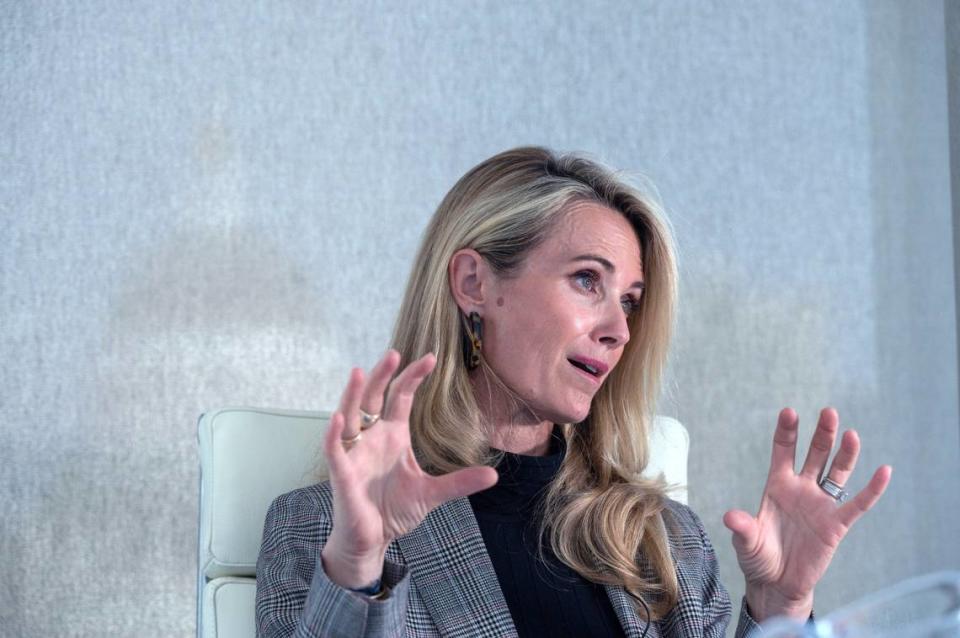California’s First Partner raises her voice and changes the future for women’s issues | Opinion
- Oops!Something went wrong.Please try again later.
When I walked into Jennifer Siebel Newsom’s office in Downtown Sacramento, California’s first partner was on the phone with her youngest son, Dutch. She mouthed a silent apology to me, and I was reminded of all the times I called my own mother while she was at work, and she would unfailingly pick up the phone.
Siebel Newsom’s son Dutch, so far best known for upstaging his dad’s 2019 inaugural speech, is now 7, and was complaining to his mom that afternoon of a stomach ache. His mom offered some kind advice, said goodbye and apologized again before she slid into a seat at the small table in her white carpeted office on the ninth floor of the Capitol Annex Swing Space — just down the hall from her husband in the governor’s office.
Opinion
California’s first partner wears many titles: She’s a public figure, a mother and the partner of the state’s highest official. She is expected to be both a thought leader and role model. Every move, word and decision she makes is under scrutiny.
But that is representative of most women, of their goals and the often unachievable expectations they place on themselves to be perfect mothers, wives, bosses and employees — almost always in the service of someone else, and almost always unappreciated.
The issues she brings attention to, including pay equity, childcare costs, sexual harassment and women’s economic value, are too often shunted to the side as secondary, when, in reality, they affect more than half the population directly, and all of us indirectly. The U.S. gross domestic product could be as much as 5% higher if women participated at the same rate as men in the workforce, and that’s just in California alone.
There’s hardly another state in the nation whose administration can claim to spend as much time on women’s issues as California, and that’s largely due to the First Partner bringing attention to that work.
Her voice is an invaluable asset in the nearest seat possible to the governor, and her unfailing support is a constant reminder to the still-majority of men in power that women — our votes and our voices — will not and cannot be ignored.
Women’s work
First ladies (though Siebel Newsom prefers the more inclusive “first partner”) are historically expected to support their husband, his politics and his work, call attention to a pet social cause and raise a family, all while in the public eye. Despite the passage of time and the forward movement of feminism, those duties have not disappeared for many political wives.
First ladies are always on display. Many voters might remember that Michelle Obama’s platform was public health and reducing childhood obesity. Some might remember that former First Lady of California Maria Shriver worked to promote service and volunteerism.
Michelle Obama, however, was an extremely qualified lawyer in her own right, and Shriver a talented journalist. Siebel Newsom’s background is in Hollywood, and she’s used the tools of her former career to highlight the social and financial inequalities faced by working women and mothers. Her documentaries “Miss Representation” and “Fair Play,” among others, have explored the complex depths of women’s pervasively underwhelming representation in media and the effects of toxic masculinity on boys. Siebel Newsom’s nonprofit, The Representation Project, seeks “to fight sexism through films, education, research and activism.”

As the governor’s wife, Siebel Newsom uses the publicity her role garners to speak out against the double standards that women still face.
“I just try to share my values, which is that I care about women,” she said. “But we, as a society, need to center women. Without us, the economy won’t work.”
Siebel Newsom is challenging our thinking on gender issues, too often an afterthought, “to make gender mainstream,” said Holly Martinez, executive director of the California Commission on the Status of Women and Girls.
“If we want to continue to be a place where ... Californians can thrive, we have to recognize the incredible role women play in every facet, from the economy to the home,” Martinez said.
Yet her chosen platform results in the epitome of a Californian contradiction: Siebel Newsom, arguably one of the nation’s leading advocates for women’s equality and equal pay, and a champion of working women and mothers, will always be defined by the success of her husband’s career.
Siebel Newsom’s fourth wave
The old saying is that where California goes, so goes the nation. With her long history of fighting for the rights of women and children, Siebel Newsom has utilized her power-adjacent position in order to move both the state and the nation closer to fourth-wave feminism, characterized by women’s empowerment and intersectionality.
“More and more women are realizing that feminism isn’t a dirty name,” she said. “It took the rollback or reversal of Roe v. Wade and what’s been happening across states to wake some women up.”

Siebel Newsom bravely testified last year in the California rape trial against disgraced Hollywood producer Harvey Weinstein. Her testimony was hung out to dry by right-wing media and by Weinstein’s defense team, criticized under the guise of outdated and insulting presuppositions of how a woman is “supposed” to act after being raped.
Despite monumental shifts from social changes such as the #MeToo movement, 34% of female employees report they have been sexually harassed by a colleague at work; 37% said it disrupted their career advancement.
State Sen. Nancy Skinner, head of the Women’s Caucus, said, “(Siebel Newsom) has really impressed me for her willingness and courage to speak out as a survivor of sexual assault.”
Meanwhile, whereas so many other states have stripped women and LGBTQ+ people of their freedoms and rights, “California stands as a beacon of hope for a more equal and equitable future,” said Nancy Cohen, president of the nonprofit Gender Equity Policy Institute. “Siebel Newsom’s media work and her fearless advocacy, both public and private, have been enormously influential in making California a leader on gender equity.”
Pay me what you owe me
Siebel Newsom has made it a priority to highlight each Equal Pay Day throughout the year with events, speeches and, just recently in August, a brunch with some of the Sacramento region’s best-known moms, such as Skinner and Martinez as well as State Sen. Angelique Ashby (D- Sacramento) and Jessica Stender, policy director at Equal Rights Advocates.
On average, working women earned $0.83 cents for every dollar men earned in 2022. The disparity is almost always worse for women of color.

Working fathers are almost twice as likely to be recommended for a raise than working mothers, and single women are promoted over working mothers almost six times as much. Women who start families can expect to see stagnancy in their overall salary.
According to Forbes magazine, a 20-year-old woman starting full-time work this year can expect to earn approximately $400,000 less over a 40-year career compared to a man in the same position. When women do forge a path in higher-paying fields and industries such as STEM, construction or manufacturing, they often face unequal treatment and a hostile work environment.
“Even if California ... has the strongest pay laws in the country, we … are trying to close that pay gap,” Siebel Newsom said. “And years, decades, centuries of having a pay gap has led to an incredible wealth gap.”
Never done
Siebel Newsom’s eldest child, Montana, turned 14 just last month. In four short years — the length of her father’s current term in office — she’ll be a young woman and a voter. Like every other American woman, she’ll dive headfirst into the complexities of what it means to embody that title.
I asked her mom what advice she would give to California’s next generation of young women. Siebel Newsom briefly flashed the same sad but knowing smile I’ve seen on a thousand women.
“My advice … is to spend less time worrying what others think ... and more time on figuring out what she’s passionate about,” she said. “On how she can use her voice and her unique talents to make a difference in the world — and to not let anyone stop her.”

